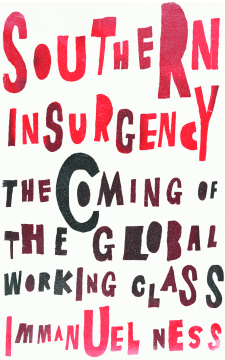
Additional Information
Book Details
Abstract
The site of industrial struggle is shifting. Across the Global South, peasant communities are forced off the land to live and work in harsh and impoverished conditions. Inevitably, new methods of combating the spread of industrial capitalism are evolving in ambitious, militant and creative ways. This is the first book to theorise and examine the present and future shape of global class struggles.
Immanuel Ness looks at three key countries: China, India and South Africa. In each case he considers the broader historical forces at play - the effects of imperialism, the decline of the trade union movement, the class struggle and the effects of the growing reserve army of labour. For each case study, he narrows his focus to reveal the specifics of each grassroots insurgency: export promotion and the rise of worker insurgency in China, the new labour organisations in India, and the militancy of the miners in South Africa.
This is a study about the nature of the new industrial worker in the Global South; about people living a terrifying, precarious existence - but also one of experimentation, solidarity and struggle.
'This book will throw challenges to the conventional economics of collective bargaining'
Debdas Banerjee, Author: Labour, Globalization and the State, Professor, Centre for Development Studies, Central University of Bihar
'Provides the most crucial case studies of alternative worker organising in the major centres of industrial production in China, India, and South Africa - where workers recognise their power and act to end exploitation'
May Wong, Globalization Monitor, Hong Kong
'Illuminates the most important questions of our time: can the democratic and transformative currents which inspired the movements of the past re-emerge today?'
Frances Fox Piven, City University of New York Graduate Center
'Seminal and distinctive'
Arup Kumar Sen, Associate Professor, Serampore College, West Bengal, India.
'Richly reports a qualitatively different practice evolving in India, China, and South Africa. It is horizontal rather than vertical. At this living moment all over our globe, workers are reaching out hands, first to their workmates, then to other workers everywhere'
Staughton Lynd, historian, author, activist
'Provides dramatic case studies of worker resistance to corporate exploitation and state violence, through the formation of militant organisations in factories and within their communities'
Bill Fletcher, Jr., Author of Solidarity Divided and syndicated columnist
'Offers insights on global labour struggles in an era when familiar unions seem exhausted, or at least too weak to make a concerted effort - with concrete examples of workers forming independent unions in the Global South'
Paul Buhle, historian and author
'The first book to theorise and examine the present and future shape of global class struggles. Analytically brilliant and empirically sound ... a superb portrait of the trajectory of the independent workers' struggle'
Sushovan Dhar, New Trade Union Initiative, India.
'Essential reading for anyone who wants to understand the present form of militant unionism in the Global South'
Gregory Wilpert, director of TeleSUR English
'Tells us how democratic forms of worker organisation can overcome the limitations of conventional labour unions and challenge global capitalist exploitation'
Lee Chun Wing, Hong Kong Polytechnic University
Table of Contents
| Section Title | Page | Action | Price |
|---|---|---|---|
| Cover | Cover | ||
| Contents | v | ||
| Maps, Figures and Tables | ix | ||
| Preface and Acknowledgements | xi | ||
| Introduction: The New International Working Class | 1 | ||
| Part I: Capitalism and Imperialism | 27 | ||
| 1. The Industrial Proletariat of the Global South | 29 | ||
| 2. Migration and the Reserve Army of Labor | 60 | ||
| Part II: Case Studies | 79 | ||
| 3. India: Neoliberal Industrialization, Class Formation, and Mobilization | 81 | ||
| 4. China: State Capitalism, Foreign Investment, and Worker Insurgency | 107 | ||
| 5. South Africa: Post-Apartheid Labor Militancy in the Mining Sector | 148 | ||
| 6. Conclusion | 179 | ||
| Notes | 191 | ||
| Index | 215 |
